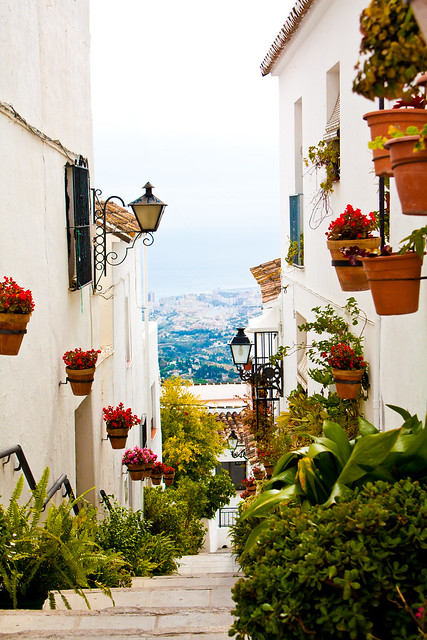Lots of questions came in, so I might do another round on Friday - if you still have any questions, feel free to comment or email! Today I'm focusing on questions that specifically relate to my program, how I got here, and how I made friends once I did (answer: I hoodwinked them all). If you're not actively planning on moving to Spain, you might want to skip to tomorrow's post, since some of these questions get a little technical, but if you're in the market then come on in!
How did you find teaching positions in Spain? My husband and I are both teachers in Charleston, SC and have been toying with the idea of teaching abroad for the past two years. Any helpful suggestions would be appreciated!!
DO IT! As long as you're willing to put up with a few paperwork hassles (see: last question in this post), it's totally doable. I am here with a program directly through the Spanish government. The only requirements are a Bachelor's degree in anything, and an "intermediate level of Spanish", which they don't test you for and which you'll want to hop on anyway if you're planning on coming to Spain. And the paperwork hassles are worth it! For more information on my program, check out the official site here and a very helpful discussion forum here. The application season is during the winter for the following fall, so all you have to do is make up your mind and submit your documents on time and you could be on your way to Spain!
What did you do to meet Spaniards? Did you walk up to them in the street? What kind of things would you say when you're first meeting them? Did you join clubs or go to meetings or make friends with coworkers, or what?
Great question! Okay, first, to all the shy people out there: you'll have to stop being shy for a little while. Give your extroverted, booty-shakin' inner self a pep talk and let her take over your body for the year. You won't meet anybody sitting at home. Second, do a search for Facebook groups in your town that hold intercambio groups (people come together to practice speaking languages to each other) and go frequently. If anybody seems particularly cool, ask them out for coffee or tapas and make friends. Third, take a class or play a sport. The Mister plays basketball a couple times a week at the local courts, and we've met a lot of people through that. Fourth, find a place to volunteer. You'll have extra time, and you'll make some cool friends. Fifth, and I know the temptation to resist is strong, but don't live with other foreigners (unless, like me, you happened to be married to one, in which case I'll let it slide). There are a lot of people that have had fabulous experiences living with expats, but I think for a lot of people it can isolate you in a non-Spanish bubble.
I am wondering if you can give some insight into how much we should plan on paying for utilities every month? I have been able to estimate costs for rent, but I am trying to budget for utilities and am not sure how much I should be figuring for.
Here in Málaga, where nobody has heat or air conditioning, we spend about 70 euros a month on utilities, including internet. Keep in mind that we're in a studio, and that could change somewhere else in a trickier climate or if you get a posh place with a dryer!
I'm teaching in Campanillas, Malaga. Would you recommend commuting from the city or trying to find a place right in Campanillas? Also, do you think it would be feasible/a good idea to buy some sort of transportation like a motor-scooter or something to get around?
Yay, you'll love Málaga! You should be fine living anywhere in the area, since some of the inter-city buses go up there. You'll probably prefer to live somewhere a little more central and then take the bus to work. My feeling is that you won't need anything for transportation except a bus pass and your two feet (they will be sore the first few weeks if my experience is any indication!).
How much money should an Auxiliar initially bring to Spain?
You should have enough money to pay for a hostel for a few nights while you look for a place to live, pay first month's rent plus a security deposit (typically a month's rent) and living expenses for a month. In Málaga, rent can run anywhere between 180 and 300 euros a month, and living expenses (includes food, going out, etc.) will probably be in the 100 to 200 euro range. All told I wouldn't come without having access to anything less than 1000 euros, but I like to be on the safe side. Some people over the years have reported not getting paid until December, but I haven't heard any stories that are that bad this year.
Also, were you always paid on time by the Junta?
Ha ha ha. Hee hee. Ho ho. (okay, I'll stop). No, I did not always get paid on time. In fact, I don't think I ever got paid on time, not even once. I was totally at the mercy of the secretary at my school who processed the payroll. One month she was sick, and, well, that was that. I didn't get paid until the month was almost over. With that said, The Mister's school paid him on time, and I think most of my friends schools did too. Like so much else in Spain, it totally depends on where you are and how lucky you get!
What documents are needed when we apply for the NIE once we get there? More specifically, my consulate does not require the medical certificate to have an apostille, but I got the impression through the manual that the program gives us that the NIE application requires the medical certificate to have the apostille. Any insight?
There are two forces at work here, one is the NIE (Foreigner Identification Number) and the TIE (Foreigner Residency Card). First, you have to show up at the Foreigner's Office (Extranjería) in your province where you will receive your NIE, oftentimes written on a post-it note to make you feel extra worried. This is ONLY the number. They didn't take any documentation from me for this, though I would bring it anyway, and did it based on the student visa. Next, you take that number plus your documentation to the Police Station (Comisaría) of your province where you apply for the TIE. This place required some documentation. Basically, bring the originals of everything that you used to apply for the visa, as well as copies of everything, EVERYTHING. When I applied for my TIE, they didn't care one bit about the medical form or the FBI background check. Unfortunately in Spain though, they love to be inconsistent about things like this and eat auxiliars for breakfast. Just because the person at my desk didn't require those forms doesn't mean the person at the desk sitting next to me didn't have to produce them. As for your apostille question, I only had the background check apostilled, not the medical certificate. If you're in doubt however, get the medical certificate notarized and head down to your state's Secretary of State's services office to get it apostilled. For any further questions on this, I would go to the Facebook groups or expatcafe.






